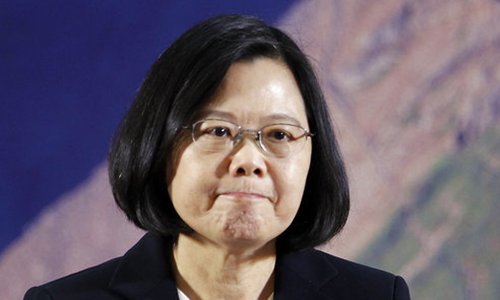Desperate Taiwan leader clutches at US straw amid a struggling economy

Photo: AP
Taiwan leader Tsai Ing-wen kick-started her four-country visit to the Caribbean on July 11 with a transit stop in New York on the first leg and another in Denver on her way back. It has been reported that Tsai would spend four nights in the US. For the Tsai authority, visiting Taiwan's "allies" is not the purpose of the trip, a decent stopover in the US is.
Tsai has confirmed she will run for Taiwan's top leader in 2020. What matters the most to her is the reception she received on her transit stops in the US and the level of US support she could garner.
For the three years Tsai has been in office, Taiwan has made little progress in improving living standards. All Tsai and her Democratic Progressive Party (DPP) can do is to play the security and diplomatic "cards."
However, the less said about her diplomatic achievements the better. Given Tsai's refusal to agree to the 1992 Consensus, the basis of cross-Straits political engagement has been lost and Taiwan can no longer keep its observer status at annual World Health Assembly (WHA) events now. Now only 17 countries have diplomatic ties with Taiwan.
Forced by the current predicament, Tsai is making more efforts to cozy up to the US, hoping to showcase her accomplishments through the so-called progress in ties with the White House.
Unfortunately, although the Tsai authority has been consistently cooperating with Washington and opening its coffers wide to purchase US arms, Washington treats the island only as a pawn and tends to make empty promises.
Washington is incapable of helping Taiwan arrest flagging support from allies as their number keeps decreasing. When it comes to economic and trade issues, the US refuses to make any compromise with the island of Taiwan. According to a March article in Taipei Times, "Taiwan's restrictions on imports of pork and beef from the United States remain a major barrier to trade between the two sides." It also noted, "Taiwan has not followed international standards or a bilateral protocol with the US on the issue of American meat imports."
The US Commerce Department said on July 2 that it would impose duties of up to 456 percent on certain steel produced in South Korea or the island of Taiwan that is then shipped to Vietnam for minor processing and finally exported to the US. Ironically, Chen Ming-tong, "head" of the Mainland Affairs Council of Taiwan, delivered a speech on the same day at the Heritage Foundation in Washington, saying that deepening Taiwan-US relations provide solid backing for cross-Straits peace.
Moreover, people of Taiwan are not interested in Tsai's diplomatic approach. Some Taiwan media outlets said every visit of Tsai to "allies" is extremely expensive and brings little benefit.
To maintain "diplomatic relations" with Panama, Taiwan has paid huge amounts of money to the country. Yet Panama snapped ties with the island in 2017.
Currently, Taiwan people are more concerned about the economy and their living standards as well as the improvement of cross-Straits relations, rather than the closeness between the island of Taiwan and the US, which the Tsai authority often brags about.
Taiwan had experienced rapid economic development in the last century and was once called one of Asia's four little dragons. But in the 21st century, the island's economic growth has been continuously decelerating.
Worse, wages of its people, especially the youths, have stagnated. The real average monthly salary of employees in Taiwan's industrial and services sectors in 2018 was even below that in 2001.
Instead of "stopover diplomacy" in the US, policymakers in Taiwan should concentrate on resolving the island's economic issues and improving living standards. They should adopt a proactive approach to cross-Straits ties so as to seek more opportunities for Taiwan's development rather than creating confrontation across the Straits in pursuit of their own interests.
The author is an associate research fellow at the Institute of Taiwan Studies of Chinese Academy of Social Sciences. opinion@globaltimes.com.cn